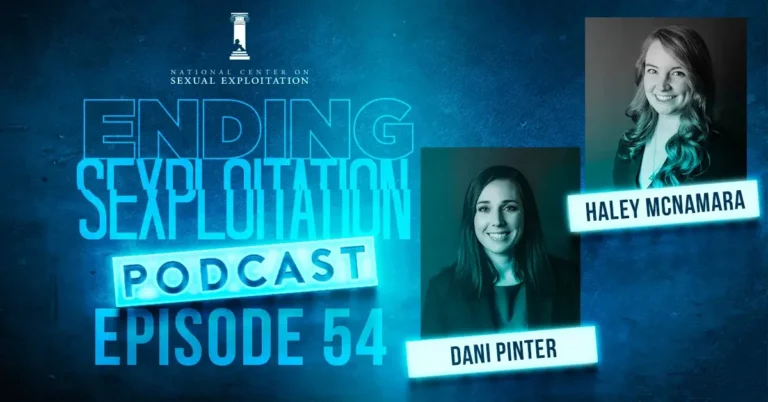October marks Mental Health Awareness Month, with the week of October 3-9 dedicated to highlighting the impact and importance of mental health.
As the National Alliance on Mental Illness explains:
“Each year, millions of Americans face the reality of living with a mental health condition. However, mental illness affects everyone directly or indirectly through family, friends or coworkers. That is why each year, during the first week of October, NAMI and participants across the country raise awareness of mental illness, fight discrimination and provide support through Mental Illness Awareness Week (MIAW).
We believe that mental health conditions are important to discuss year-round, but highlighting them during MIAW provides a dedicated time for mental health advocates across the country to come together as one unified voice.”
The National Center on Sexual Exploitation recognizes the importance of mental health awareness and care, especially when considering the intersection of sexual exploitation and abuse and mental health.
Psychological Impact on Trafficking Victims
One often ignored topic in discussions of mental health is the psychological effects of sex trafficking on victims. Survivors of sex trafficking and abuse who do not receive sufficient trauma-informed care and services may continue to suffer countless problems and lifelong impacts. Sex trafficking victims may suffer in silence while law enforcement and other agencies focus on apprehending those responsible for the crime. While this legal accountability for abusers and perpetrators is important, the justice system alone cannot provide the necessary support for recovery. No amount of legal action can undo the psychological trauma that survivors of sexual exploitation have suffered; recovery takes more than simply removing victims from their trafficking situation and prosecuting their abusers.
In some instances, survivors may be afraid to identify themselves as victims of trafficking for fear of being charged with prostitution or related charges. Lack of understanding about sex trafficking may increase stigma and make it harder to seek help. This highlights the the need for demand reduction efforts in order to tackle the problem of commercial sexual exploitation at the root. These varying circumstances make it not only difficult but stigmatizing for survivors of sex crimes to get the mental health support they need.
Psychological Effects of The Sex Industry As a Whole
In understanding the psychological effects of human trafficking, we first must understand the many forms and intersections of how sex trafficking manifests; prostitution, pornography, stripping, live-sex shows, mail-order brides, military prostitution and sex tourism are just some ways the exploitative commercial sex industry preys on vulnerable women, men, and children.
Research shows that pornography performers suffer serious psychological and physical harms as a result of their involvement in pornography. Many have backgrounds of sexual abuse and enter the industry out of financial desperation. Exiting the pornography industry can be especially difficult as the stigma of having been involved in the industry can haunt women the rest of their lives. To read more about the experiences of women in the pornography industry, see this article.
The Commercial Sex Industry’s Predatory Nature
At its core, the commercial sex industry preys on vulnerable populations—including those with mental health issues. In other words, systems of prostitution have a predatory dependence on people with vulnerabilities such as economic insecurity, barriers to higher education, racial discrimination, homelessness, or with histories of adverse childhood experiences such as child sexual abuse. This goes hand in hand with mental health, as those with previous mental health issues or low self-esteem are also vulnerable to the predatory commercial sex industry. For example, a recent meta-analysis found that some of the strongest risk factors for child sexual exploitation included a diagnosis of PTSD, past exposure to child pornography, and a history of childhood sexual abuse. Mental health issues can be both a risk factor for and consequence of sexual exploitation.
In instances of trafficking and exploitation, individuals are stripped of their humanity and bodily autonomy. Sexually abused women and girls are subject to rape, kidnapping, exploitation, and torture. In the aftermath, survivors are left psychologically shattered, and often times are not able to recover fully. Even if they eventually acclimate themselves back into new roles in society, they are very often triggered by outside stimuli that reminds them of the abuse they endured, a common symptom of PTSD. This can cause them to shut down and be taken back to the moments where they were abused, and make navigating through a healthy life that much more difficult.
Research Shows the Mental Health Impact on Survivors
As a result of their complex experiences in sex trafficking and the larger commercial sex industry, many survivors develop mental health disorders, the most common being post-traumatic stress disorder (PTSD), depression, and anxiety disorders.
For example, one study of 107 sex trafficking survivors aged 14-60 from eleven U.S. cities found that several experienced negative mental and psychological conditions, including:
- Depression (88.7%)
- Anxiety (76.4%)
- Nightmares (73.6%)
- Flashbacks (68%)
- Low self-esteem (81.1%)
- Feelings of shame or guilt (82.1%)
- Post-traumatic stress disorder (54.7%)
- Suicide attempts (41.5%)
Clearly, survivor services must prioritize mental health care when working with victims of trafficking and those exiting the abusive world of the commercial sex industry, including the pornography industry.
The psychological impacts on those within these exploitative systems cannot be overstated—more attention must be brought to the harmful impacts of prostitution and pornography on survivors, and how sex trafficking is deeply intertwined with these systems.



